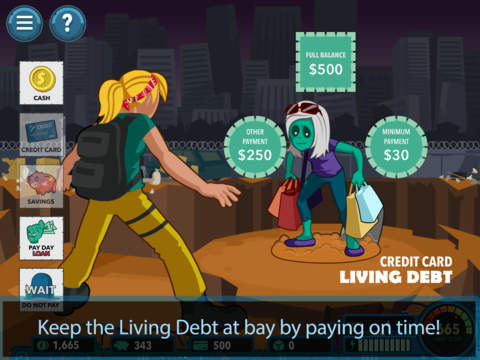Night of the Living Debt, developed by the Learning Games Lab at New Mexico State
University, has won gold honors in the 2016 International Serious Play Awards competition
under the K-12 Financial Literacy category.
Night of the Living Debt offers
lessons in financial literacy for young people through a video game scenario
created by University of Idaho Extension educators Luke Erickson and Lyle
Hansen.
The free game is available for distribution on Apple
iTunes for use on iPads.
Designed for high schoolers, it is also
suitable for adults interested in learning about credit issues and
debt, giving players the opportunity to learn real world principles of
credit-building. The underlying learning concepts driving game context are
Credit Scores, Credit Reports, Healthy Credit Card Strategies, Subprime
Lending, Saving and Emergency Funds.
Funded by agricultural lender CoBank, the game
was developed by New Mexico State University for the Northwest
Youth Financial Education
program, a multi-state partnership between Northwest Farm Credit Services,
University of Idaho Extension, and the extension systems of Alaska, Washington,
Oregon, and Montana. Extension educators, Luke Erickson and Lyle Hansen, serve
as co-leaders of this program.
During development, the Night of the Living Debt was tested
in classroom settings and in the NMSU Learning Games Lab
Through this Serious Game, students shall gain
a greater understanding of the impact of their financial decisions on savings
and credit scores, which include making payments on time, keeping balances low,
understanding differences between lenders and preparing for financial
emergencies, but in a game world where unforgiving zombies are the creditors!
In the game, zombies have taken over the
financial world and require regular payments if you and your credit score are
to stay in one piece.
During the game, players must earn income by
finding prizes and cashing them in. The next step is deciding whether to invest
in a college education, a car or a more expensive home, and whether to save
money or get a credit card. Credit cards are a key to establishing good credit
in the game, a notion that goes against popular financial advice.
For the gamers, deciding to use a credit card
creates a zombie that stalks the card holder demanding payment. Whenever a
decision involves the use of credit, a zombie is created that follows the
player until the debt is satisfied. Or the rent zombie appears to collect. Or
the car payment zombie.
The game teaches players that some debt can
help them to establish good credit. The trick is to use the card enough and to
pay it regularly so that players create a positive credit history. Overextending
themselves, in the game’s world as in real life, makes them vulnerable
financially.
“We didn’t make the rules,” Hansen said, “but
we want players to understand what the rules are so they can get an A on their
credit score.”
The credit score is increasingly important,
Erickson added. More than half of employers use credit in evaluating job
candidates. The military uses personal credit information to assess security
clearances, which in turn are used to determine whether candidates can advance
in rank.
“Credit cards, if you use them as we suggest,
can be a very powerful and helpful tool to build your credit. If you abuse
them, they can get you into a lot of trouble,” Erickson said.
And like revolving credit obligations
everywhere, the zombies aren’t all that scary on screen, but their demands are
the stuff of nightmares.
The Serious Game employs a reverse strategy
from the Erickson and Hansen’s popular Credit Score Millionaire
game that displays directly how financial decisions
can affect credit scores and the costs to consumers.




